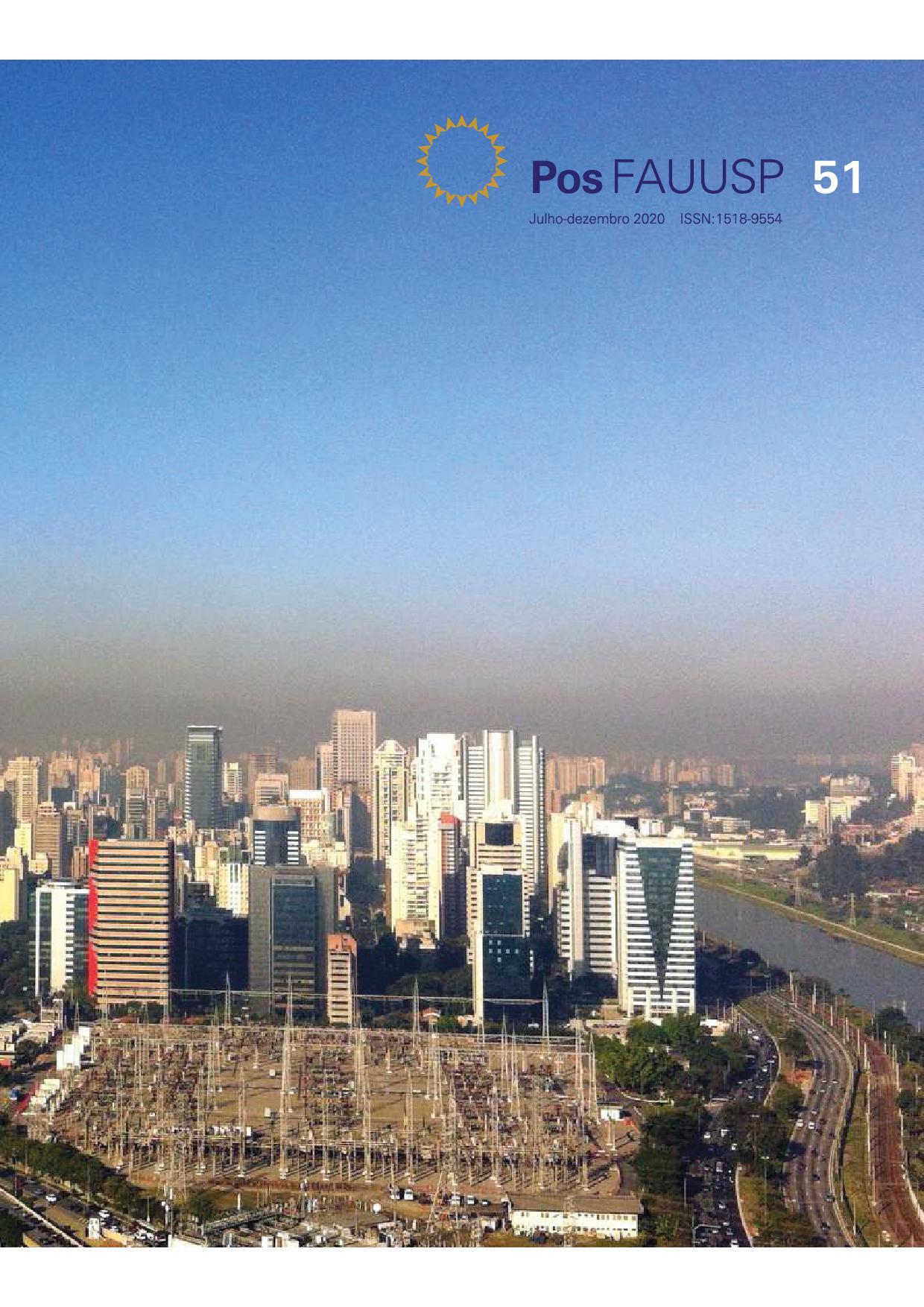Canned architecture: Matosinhos and the Atlantic history of canned sardines
Matosinhos e a história atlântica da arquitetura das sardinhas
DOI:
https://doi.org/10.11606/issn.2317-2762.posfau.2021.168263Keywords:
Fishing architecture, Canned fish, Industrialization, UrbanizationAbstract
The study of the relationship between fishing and architecture can reveal new perspectives for understanding the dynamics between the coast and the sea and contribute to the formulation of strategies for the organization of coastal territories, directly affected by climate change and the environmental crisis. This article seeks to understand the recent urban history of Matosinhos from fishing, a fundamental vector for the urbanization of this port city in the North of Portugal, mainly through the production of canned sardines. The intensive production of this industrialized food reveals cultural aspects that created myths and traditions, economically and politically explored, but also suggests an Atlantic geography to understand the characteristic flows and circulations of the production and consumption of canned fish. When analyzing the transformations of this activity in an integrated manner between different fields of knowledge, we seek to establish relationships between the ecological aspects of the exploitation of a specific natural resource and its impacts on the built environment.
Downloads
References
AMORIM, Inês. Técnicas de pesca na costa portuguesa: melhorar ou inventar? Um percurso de investigação. Zainak: Cuadernos de Antropología-Etnografía. Donostia-San Sebastian: Eusko Ikaskuntza, n. 25, p. 349-368, 2002.
ARS ARQUITECTOS. Uma fábrica de conservas moderna. Conservas de peixe. Lisboa: Sociedade da Revista Conservas de Peixe, n. 6, set. 1946.
BAILYN, Bernard. Atlantic history: concepts and contours. London/Cambridge: Harvard University Press, 2005. 149p. DOI: https://doi.org/10.2307/j.ctvjz8180.
BALDAQUE DA SILVA, António Arthur. Estado atual das pescas em Portugal compreendendo a pesca marítima, fluvial e lacustre em todo o Continente do reino, referente ao ano de 1886. Lisboa: Imprensa Nacional, 1891. 3v.
BOULARD, Jean-Claude. L’Epopée de la sardine, un siècle d'histoires de pêches. Paris: Editions maritimes et d’outre-mer, 2003. 224p.
BRIOIST, Pascal; FICHOU, Jean-Christophe. La sardine à l’huile ou le premier aliment industriel Nicolas Appert et Joseph Colin: une filiation douteuse. Annales de Bretagne et des Pays de l’Ouest. Rennes: Presses universitaires de Rennes, v. 119, n. 4, 2012, p. 69-80. DOI: https://doi.org/10.4000/abpo.2493.
ELLEFSEN, Karl Otto; LUNDEVALL, Tarald. North Atlantic coast – A monography of place. Oslo: Pax Forlag, 2019. 400p.
GANSHIRT, Christian. Álvaro Siza. Piscina na praia de Leça de Palmeira 1959-1973. Lisboa: Blau, 2004. 96p.
GASCUEL, Didier. Pour une révolution dans la mer: de la surpêche à la résilience. Arles: Actes Sud, 2019. 530p.
FERNANDES, Hugo Nazareth. Em busca de luz, ar e claridade. In: MONTEIRO, Bruno; PEREIRA, Joana (Org.). De pé sobre a terra. Estudos sobre a indústria, o trabalho e o movimento operário em Portugal. Lisboa/Porto: Instituto de História Contemporânea, Universidade Nova de Lisboa e Instituto de Sociologia, Universidade do Porto, 2013, p. 35-60.
GODECHOT, Jacques. Histoire de l’atlantique. Paris: Bordas, 1947. 364p.
HENRIQUES, Francisco. A ‘Organização Nacional das conservas de peixe’: economia dos interesses e ordenamento corporativo (1927-1938). Estudos do século XX. Coimbra: Imprensa da Universidade, n. 16, 2016, p. 145-163. DOI: https://doi.org/10.14195/1647-8622_16_8.
LOSA, Arménio. A arquitectura e as novas fábricas. In: Congresso Nacional de Arquitectura promovido pelo Sindicato Nacional dos Arquitectos, 1, 1948, Lisboa. Relatório da Comissão Executiva / Teses, conclusões e votos do congresso. Lisboa: Ordem dos Arquitectos, 1948/ 2008 (edição fac-símile), p. 127-135.
MATA, Maria Eugénia. Environmental challenge in the canning industry: the Portuguese case-study of the early twentieth century. Historical Social Research. Mannheim: GESIS Leibniz Institute for the Social Sciences, v. 35, n. 4, 2010, p. 351-372. DOI: https://doi.org/10.12759/hsr.35.2010.4.351-372.
MIRANDA, Adriana. Arquitectura industrial em Matosinhos Sul. 2003. 2 vol. Prova Final para licenciatura em Arquitectura – Faculdade de Arquitetura da Universidade do Porto, Porto, 2004.
PINHO, António Duarte. O consumo de pescado e a internacionalização do setor das pescas em Portugal. Lisboa: Editorial Minerva, 2019. 135p.
RIBEIRO, Orlando. Portugal, o Mediterrâneo e o Atlântico: estudo geográfico. Coimbra: Coimbra Editora, 1945. 246p.
RIETH, Eric. Octávio Lixa Filgueiras: um antropólogo de arquitectura naval de vernáculo português. In: GARRIDO, Álvaro (Coord.) Barcos de Portugal – obras selecionadas de Octávio Lixa Filgueiras. Ílhavo: Câmara Municipal/Museu Marítimo de Ílhavo, 2013, p. 7-15.
SALGADO, José. Álvaro Siza em Matosinhos. Matosinhos: Câmara Municipal/Pelouro da Cultura e do Turismo, 1985. 157p.
SARAIVA, Tiago. Fascist pigs – Technoscientific organisms and the history of fascism. Cambridge: MIT Press, 2016.
ERÉN, Maria do Carmo. Mitologias da pesca e pescadores de Matosinhos. In: CÂMARA MUNICIPAL DE MATOSINHOS (Org.). Uma cidade assim: Fotografias de Larry Fink e Bruno Sequeira. Matosinhos: Câmara Municipal, 1996, p. 11-47.
SOARES, Nelson. Ramirez – Memórias de cinco gerações. Matosinhos: Ramirez e Companhia, 2011.
TAVARES, Domingos Casas na duna. Porto: Dafne editora, 2018.
VENTURI, Robert; SCOTT BROWN, Denise; IZENOUR, Steven. Learning from Las Vegas: the forgotten symbolism of architectural form. Cambridge: MIT Press, 1972. 192p.
Downloads
Published
Issue
Section
License
Copyright (c) 2021 Diego Beja Inglez de Souza, André Tavares

This work is licensed under a Creative Commons Attribution 4.0 International License.

This work is licensed under a Creative Commons Attribution 4.0 International License.
DIADORIM - Diretório de Políticas Editoriais
How to Cite
Funding data
-
Fundação para a Ciência e a Tecnologia
Grant numbers PTDC/ART-DAQ/ 29537/2017












